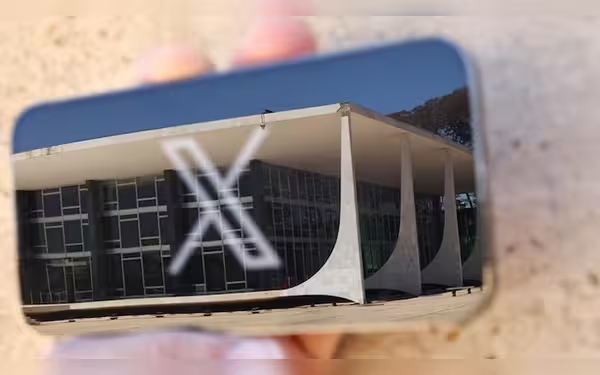Saturday, November 16, 2024 07:30 PM
X Resumes Services in Brazil After Court Compliance
- Supreme Court allows X to resume operations in Brazil.
- Elon Musk complies with court orders on hate speech.
- X faces challenges regaining user trust post-suspension.
 Image Credits: thenews
Image Credits: thenewsX, formerly Twitter, resumes services in Brazil after complying with Supreme Court demands on hate speech moderation.
In a significant development for social media users in Brazil, the Supreme Court has granted permission for X, the platform formerly known as Twitter, to resume its services in the country. This decision comes after the billionaire owner Elon Musk decided to comply with court rulings that he had previously resisted. The Supreme Court's ruling marks a turning point in a long-standing dispute between Musk and Brazilian authorities, particularly with Justice Alexandre de Moraes, who has been at the forefront of enforcing laws against hate speech and misinformation.
X had been suspended in Brazil since late August due to its failure to adhere to court orders regarding hate speech moderation and the absence of a legal representative in the country. Musk had initially labeled these orders as "censorship" and referred to Moraes as a "dictator." However, in recent weeks, Musk's stance shifted as X began blocking accounts flagged by the court, appointed a local representative, and settled outstanding fines.
Justice Moraes announced that X had fulfilled all necessary requirements to restart its operations, allowing the platform to come back online immediately. However, as of 7 PM local time, users were still unable to access X. The platform expressed its pride in returning to Brazil, emphasizing its commitment to "defend freedom of speech, within the boundaries of the law" in the countries where it operates.
The conflict in Brazil is part of a broader trend where Musk has found himself at odds with various governments, including those in Australia and the United Kingdom, over issues related to online misinformation. Brazil's communication minister hailed X's compliance as a "victory for the country," stating, "We showed the world that here our laws should be respected, by whomever it may be." This sentiment reflects a growing insistence on accountability for all businesses operating within Brazilian borders.
The suspension of X had significant implications, particularly during Brazil's municipal elections, which took place recently. Many users migrated to alternative platforms like Bluesky and Meta-owned Threads during this period. X's legal troubles began when it closed its offices in Brazil in mid-August, failing to appoint a local representative, which ultimately led to its suspension.
As X resumes its services, it faces the challenge of regaining the trust of its users, many of whom have turned to other platforms during its absence. The reinstatement of X in Brazil serves as a reminder of the delicate balance between freedom of expression and the need for responsible content moderation. As social media continues to evolve, the actions of platforms like X will be closely scrutinized, not only in Brazil but around the world.
The resolution of X's suspension in Brazil highlights the importance of adhering to local laws and regulations, especially for global companies. As users return to the platform, it will be interesting to see how X navigates the complex landscape of free speech and legal compliance in the future. The ongoing dialogue between social media companies and governments will undoubtedly shape the way these platforms operate, ensuring that the principles of democracy and accountability remain at the forefront.













